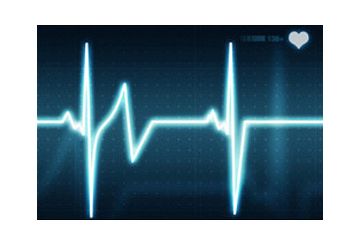Increased Heart Rate at Rest May Predict Disease

An increase in the heart rate of people at rest might indicate they are at a higher risk of dying from heart disease than other healthy-appearing people are, a new study from Norway suggests.
The study involved nearly 30,000 men and women without a history of heart disease. Participants whose resting heart rates increased by more than 15 beats per minute over a 10-year period were almost twice as likely to die from ischemic heart disease as those whose heart rates remained stable. Patients with ischemic heart disease suffer from a reduced blood supply to the heart, usually due to a buildup of plaque in arteries.
A rise in resting heart rate was also linked to an increase risk of dying from any cause, but that link was weaker, the researchers said.
The findings suggest an increased resting heart rate may be a way to identify more people who could benefit from measures aimed at warding off heart disease, but more work is needed to validate this, the researchers said. They noted that, because the study participants were relatively healthy, their overall risk of dying from heart disease remained quite small.
A person's resting heart rate can be easily assessed at home, noted study researcher Ulrik Wisløff, of the Norwegian University of Science and Technology, in Trondheim.
Changing heart rate
The researchers examined information from 13,499 men and 15,826 women from Norway. Participants had their resting heart rate measured twice: once between 1984 and 1986, and again 10 years later, between 1995 and 1997. Participants were then tracked for 12 more years.
Sign up for the Live Science daily newsletter now
Get the world’s most fascinating discoveries delivered straight to your inbox.
During the follow-up period,3,038 people died. Of them, 975 died from cardiovascular disease, including 388 from ischemic heart disease.
Participants whose heartbeats per minute at rest rose from less than 70 at the first measurement to greater than 85 at the second measurement were 90 percent more likely to die from ischemic heart disease over the study than participants whose resting heart rates were less than 70 beats per minute at both measurements.
This increased risk translates to nine extra deaths per 10,000 people per year, the researchers said.
Participants whose heart rates rose more than 15 beats per minute were also 50 percent more likely to die from any cause, compared with those whose resting heart rates remained stable.
The increased risk remained even after researchers took into account factors that could affect the results, such as the participants' physical activity levels and smoking habits.
A decrease in resting heart rate did not appear to reduce the participant's risk of death during the study period, the researchers said.
Keep your heart rate low
Doctors knew a high resting heart rate isn't good (it is associated with an increased risk of dying from cardiovascular causes), but the new study is one of the first to look at the effect of a change in heart rate over time, said Dr. Christopher Cove, a cardiologist at the University of Rochester (N.Y.) Medical Center.
The findings suggest "if you have a good resting heart rate, that isn’t good enough," Cove said. "You have to maintain that over life" to keep up good cardiovascular health.
Researchers need to figure out why a rise in resting heart rate increases the risk of dying from heart disease, Cove said. For instance, is the rise a marker of unhealthy lifestyle habits, or might it indicate an underlying genetic predisposition to the heart disease?
For now, Cove said, people who have high resting heart rates should work to reduce other cardiovascular risks, such as high cholesterol and an unhealthy diet. However, it's still not clear whether such actions will actually slow the resting heart, he said.
The new study will be published tomorrow (Dec. 21) in the Journal of the American Medical Association.
Pass it on: A change in resting heart rate over time may increase the risk of death from heart disease.
This story was provided by MyHealthNewsDaily, a sister site to LiveScience. Follow MyHealthNewsDaily staff writer Rachael Rettner on Twitter @RachaelRettner. Find us on Facebook.

Rachael is a Live Science contributor, and was a former channel editor and senior writer for Live Science between 2010 and 2022. She has a master's degree in journalism from New York University's Science, Health and Environmental Reporting Program. She also holds a B.S. in molecular biology and an M.S. in biology from the University of California, San Diego. Her work has appeared in Scienceline, The Washington Post and Scientific American.











